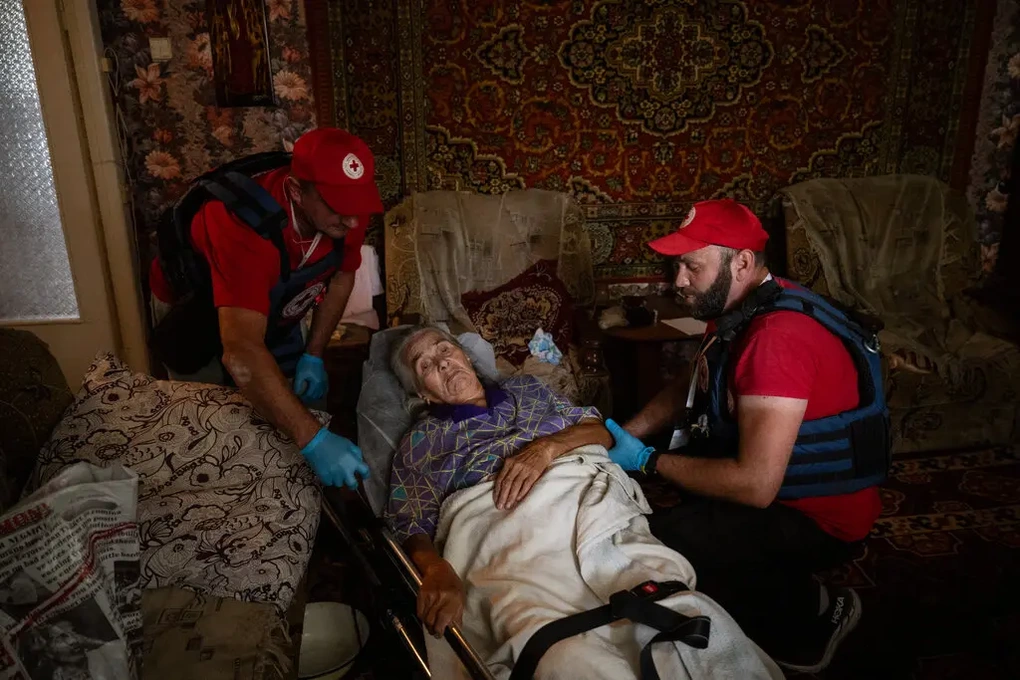
Iraida Kurylo, 83, was injured and lying at home and was cared for by Red Cross staff (Photo: NYT).
Elderly people sat in pairs in half-destroyed homes. They took refuge in moldy basements marked in chalk with the words “underground people.” This was a message to any troops who happened to be there that day.
The elderly in Ukraine are often the few remaining along the country’s hundreds of kilometers of frontline. Some have waited their whole lives to enjoy their twilight years, only to be left alone.
The homes they built with their own hands now have only broken walls and blown-out windows, with framed photos of loved ones who live far away. Some have had to bury their children, and their only wish is to be close so that when they die, they can be buried next to their children.
But things don't always go their way.
“I have lived through two wars,” said Iraida Kurylo, 83, whose hands trembled as she recalled her mother screaming as her father died in World War II. She was still lying on a stretcher in the village of Kupiansk-Vuzlovyi, her hip broken in a fall. Red Cross workers had arrived.
Nearly two years after the conflict broke out, with war on their doorstep, the elderly remain determined to stay in their homes, giving various reasons for their decision.
Some preferred to stay at home, despite the danger, rather than struggle in a strange place among people they did not know. Others could not afford to leave and start a new life elsewhere. They still received regular pensions, despite the fierce fighting. They devised ways to survive, waiting and hoping they would live to see the war end.
Internet access seems to be their only link to the outside world . One day in September 2023, at a mobile clinic about 5 kilometers from the Russian position, Svitlana Tsoy, 65, was having a telemedicine consultation with an intern at Stanford University in California and talking about the hardships of war.
For nearly two years, after their home was destroyed, Ms. Tsoy and her 89-year-old mother Liudmyla have lived in a basement in Siversk, in the eastern Donetsk region, with 20 other people. There is no running water and no toilet. But they have not left. “It is better to endure the inconvenience here than among strangers,” Ms. Tsoy said.
Halyna Bezsmertna, 57, was also present at the telemedicine clinic after breaking her ankle while diving for cover from the bombs. She also had another reason to stay in Siversk. In 2021, her grandson died and was buried nearby. “I promised someone very dear to me that I would not leave him alone. I would not be able to apologize to him if I did not keep my word,” Bezsmertna said.
Many people who decided to leave eventually realized that they were giving up not just a home but also a life.
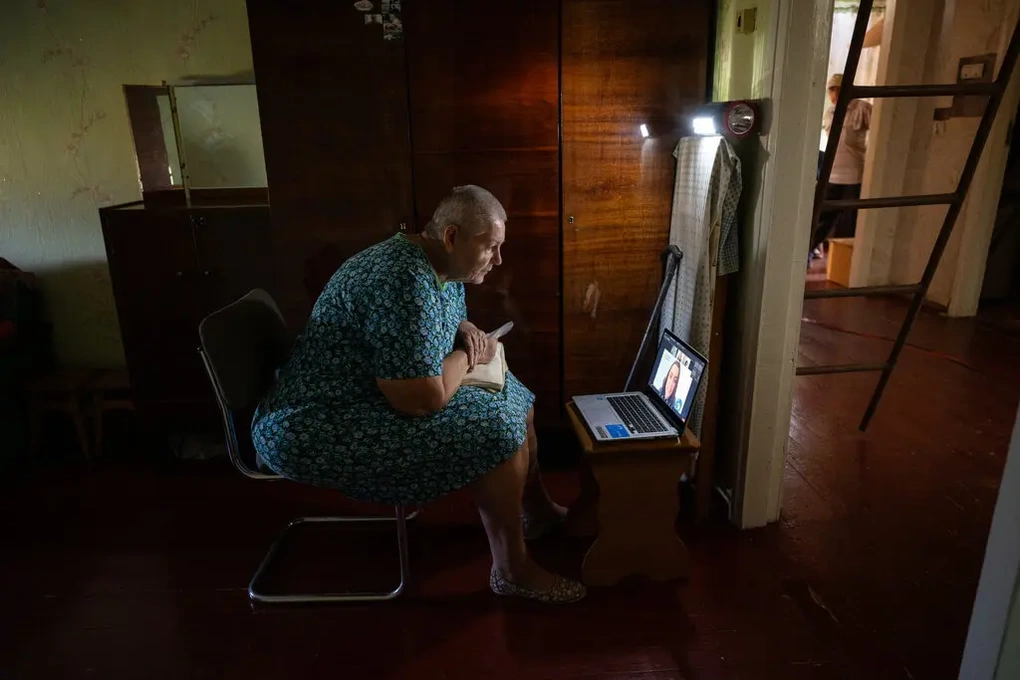
Old lady Svitlana Tsoy is having a telemedicine check-up (Photo: NYT).
In Druzhkivka, an eastern city near the front line but controlled by Ukrainian forces, Liudmyla Tsyban, 69, and her husband Yurii Tsyban, 70, took shelter in a church in September 2023 and spoke about the home they left behind in nearby Makiivka, which is under siege.
There they had a beautiful house in a village near the river and a boat. And they also had a car. "We imagined ourselves retiring and traveling there with our children and grandchildren. But the car was destroyed by the explosion," said Mrs. Tsyban.
In August, the St. Natalia nursing home in Zaporizhzhia took in about 100 elderly residents, many of whom suffered from dementia and needed 24-hour care. Nurses said that when they heard an explosion, they would tell the residents it was just thunder or a car with a flat tire so they wouldn’t be upset.
At another Zaporizhzhia nursing home, Liudmyla Mizernyi, 87, and her son Viktor Mizernyi, 58, who share a room, often talk about returning to their hometown of Huliaipole. But Huliaipole, located along the southern front line between Ukrainian and Russian forces, is now the center of the fiercest fighting.
Their son Viktor was injured and left permanently disabled when the walls of the shelter collapsed from mortar fire. After that, they felt they had no choice but to leave. “We wanted to go home, but there was nothing there, no water, no electricity, nothing,” Mr Mizernyi said.
Anna Yermolenkok, 70, said she did not want to leave her home near Marinka, Ukraine, but had to flee as the fighting got closer. She has been living in a shelter in central Ukraine since Ukraine launched its summer offensive. Neighbors have contacted her and said her home is still standing. "They are looking after my dog and my house. I pray that the war will end soon."
But those were the words of August 2023. Now, Marinka has been largely destroyed by fighting, and this month there has been growing evidence that Russian forces have taken control of the city or what remains of it.
It is not only missile attacks and artillery shelling that destroy large numbers of homes in Ukraine.
When the Kakhovka Dam along the Dnipro River broke in June 2023, floodwaters flooded nearby villages. Vasyl Zaichenko, 82, from the Kherson region, found it hard to talk about losing his home to the floods. “I have lived here for 60 years and I will not give it up. If you build your house with your own hands for 10 years, you cannot abandon it,” he said.
At a temporary shelter in Kostyantynivka in late summer, 90-year-old Lydia Pirozhkova said she had been forced to leave her hometown of Bakhmut twice in her life, the first time when German troops invaded during World War II and the second time under Russian shelling.
Source













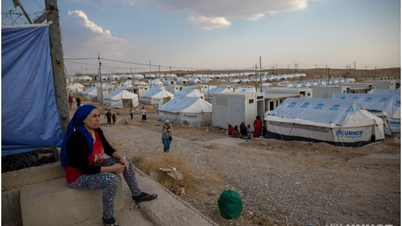
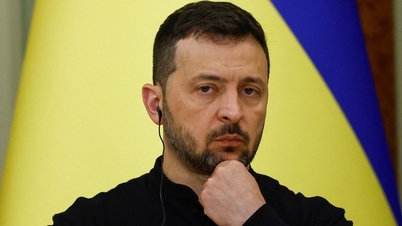



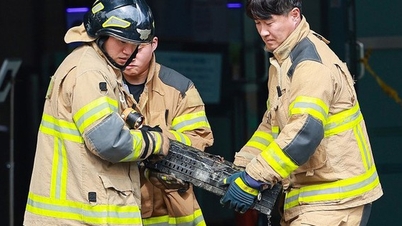

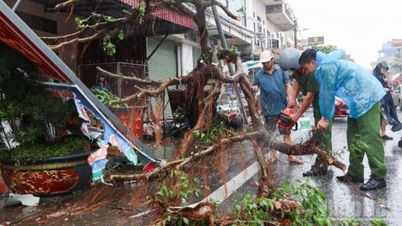



























































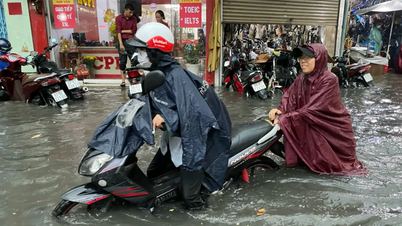






















Comment (0)